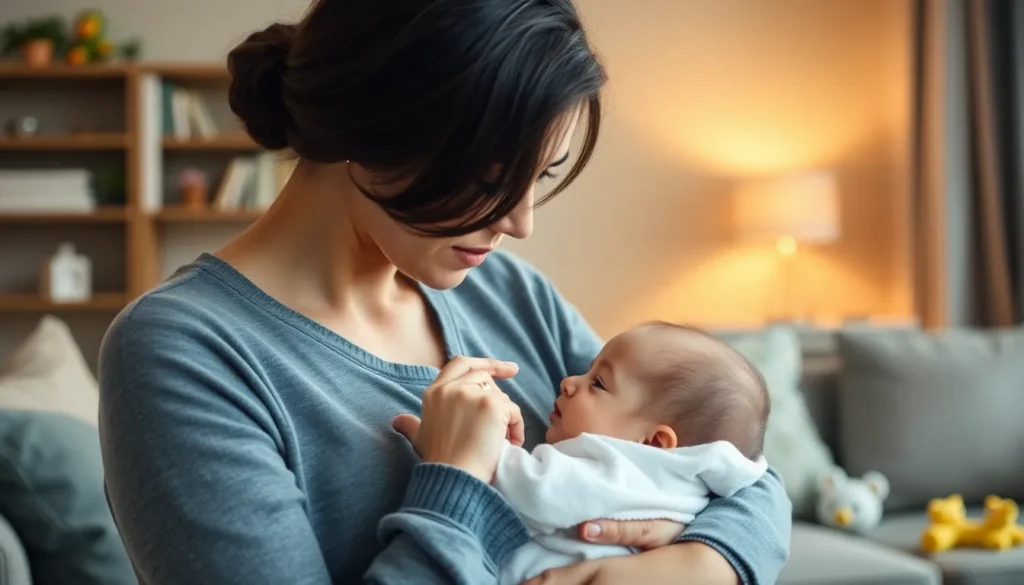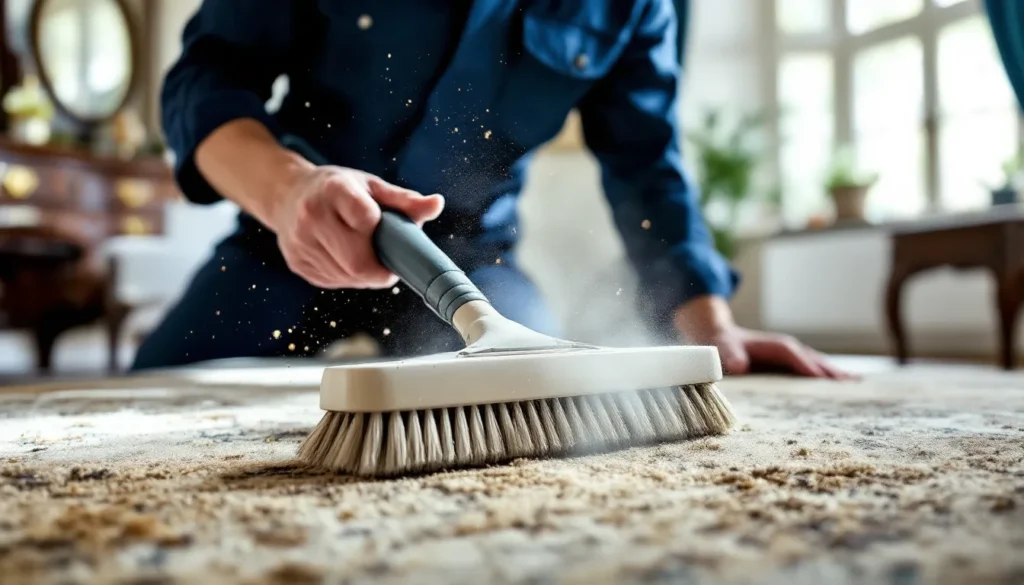Watching a baby’s hair fall out can be a shocking sight for new parents. One moment, their little one’s head is a fuzzy wonderland, and the next, it looks like a mini chia pet in distress. But fear not! This hair loss is often just a normal part of growing up, rather than a cause for concern.
Table of Contents
ToggleWhy Do Babies Hair Fall Out
Baby hair loss often occurs during the first six months. Shedding hair in infants is primarily due to changes in their body. The most common cause is referred to as telogen effluvium, where hair follicles transition to a resting phase. This phenomenon typically resolves on its own without intervention.
Genetics also plays a significant role in hair growth patterns. Some babies inherit traits from parents that influence hair shedding. Fluctuations in hormones during pregnancy can also impact baby hair. After birth, hormone levels in infants might lower, leading to temporary hair loss.
Additionally, friction from surfaces can cause hair to fall out. Frequently, rubbing against crib sheets or car seats creates wear on delicate hair strands. Staying attentive to hair care can minimize unnecessary loss.
Nutritional factors can sometimes affect hair health as well. While most infants receive adequate nutrition through breast milk or formula, changes in diet may temporarily change hair texture and density. Growth spurts also influence the shedding process, which may cause strands to thin.
Lastly, medical conditions, though rare, can contribute to excessive hair loss. Conditions such as ringworm might require medical attention. Parents should consult a pediatrician if they notice significant hair loss or if unusual patches appear.
Recognizing these factors helps in understanding why hair loss happens. Understanding it is often part of typical development, so parents shouldn’t worry excessively about the process.
Common Causes of Hair Loss in Babies

Hair loss in babies often stems from several common causes. Understanding these can provide reassurance to parents who may be concerned.
Natural Hair Shedding
Natural hair shedding occurs as part of a baby’s growth cycle. Most infants experience this within the first six months. The process involves hair follicles transitioning into a resting phase known as telogen. As older hairs fall out, new hair begins to grow in their place. This phenomenon is typical and will resolve on its own, offering parents peace of mind during this stage.
Hormonal Changes
Hormonal changes significantly influence hair growth and shedding in babies. During pregnancy, maternal hormones contribute to hair retention, but after birth, these hormone levels drop. This sudden shift can cause temporary hair loss in newborns. Fluctuations in hormone levels during the first few months post-delivery often lead to a noticeable increase in hair shedding. Parents can expect this to stabilize as their baby’s body adjusts.
Medical Conditions
Medical conditions represent a less common cause of hair loss in infants. Conditions such as alopecia areata can lead to patchy hair loss, though this is rare. Nutritional deficiencies, particularly in iron or zinc, may also impact hair health. Parents should consult a pediatrician if they notice excessive or unusual hair loss, as early assessment helps rule out any underlying issues. Understanding these factors encourages informed decisions regarding a baby’s hair health.
When to Be Concerned About Hair Loss
Baby hair loss is typically normal, but certain signs may indicate a need for concern.
Signs of Abnormal Hair Loss
Excessive shedding beyond the usual amounts may be a cause for concern. Observing bald patches or unusual thinning on specific areas of the scalp should prompt attention. Changes in hair texture or color can also signal an underlying issue. Additionally, if hair loss occurs alongside irritability or skin changes, it may warrant further investigation. Parents should monitor these signs closely and consider them within the context of their baby’s overall health.
Consulting a Pediatrician
Consulting a pediatrician is crucial when parents notice significant changes in hair loss. A healthcare professional can provide valuable insights and determine if further evaluation is necessary. Regular check-ups often include assessments of hair health as part of overall development. Nutritional concerns may arise, requiring targeted discussions about diet and potential deficiencies. Engaging with a pediatrician can alleviate concerns and offer reassurance regarding typical hair growth patterns in infants.
Tips for Caring for Your Baby’s Hair
Caring for a baby’s hair involves gentle techniques and proper nutrition. Parents can ensure healthy hair growth while minimizing hair loss with a few simple practices.
Gentle Hair Care Practices
Choose a soft-bristled brush to gently detangle hair. Using gentle strokes avoids unnecessary pulling and minimizes discomfort. Bath time presents an opportunity for hair care. Mild baby shampoo maintains scalp health and cleanliness without irritating sensitive skin. It’s important to avoid excessive washing, as it can strip natural oils. Drying hair with a soft towel is preferable; rubbing can lead to breakage. When styling, opt for loose hairstyles that won’t tug at the roots.
Nutritional Considerations
Nutritional needs play a crucial role in hair health. A balanced diet rich in vitamins supports healthy hair growth. Iron-rich foods like pureed spinach and fortified cereals can boost hair strength. Incorporating sources of zinc such as peas or chicken contributes to overall hair vitality. Omega-3 fatty acids found in fish can promote scalp health. Breastfeeding or age-appropriate formula should meet infants’ nutritional needs initially. Parents should consult pediatricians to ensure adequate dietary intake, especially if hair loss concerns arise.
Baby hair loss is a common and natural part of development that most parents encounter. Understanding the reasons behind this phenomenon can ease concerns and promote a sense of reassurance. While temporary hair shedding is typically harmless, being aware of potential signs that warrant a pediatrician’s visit is essential.
By adopting gentle hair care practices and ensuring proper nutrition, parents can support their baby’s hair health. Engaging with healthcare professionals can provide valuable insights and guidance, helping parents navigate the journey of their child’s growth with confidence. Embracing this phase as a normal aspect of development allows families to focus on the joys of parenthood without unnecessary worry.




